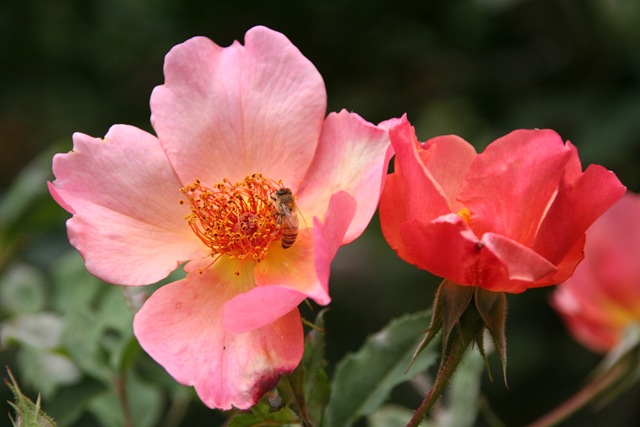-
Disease-Resistant Roses for the Pacific Northwest

As a professional gardener, my philosophy leans more towards making organic and sustainable choices in the garden, not only because I’m afraid of what long-term repeated exposure could do to my health, but also because I have the power to help so many people make better choices for their gardens. The organic philosophy can be…
-
How to Treat Rose and Flower Pests Naturally: Organic Control of Black Spot/ Powdery Mildew, and Aphids
If you’ve tried to prevent rose problems with the tips in this article, but still ended up with some pests (it happens!), here are the methods I recommend to get rid of pests on roses the organic way. (Obviously, before spraying anything, read the instructions on the bottle and be sure to suit up appropriately…
-
How to Treat Rose and Flower Pests Naturally: Prevention
The introduction to this series is here. Preventing pests with good gardening habits is the first step towards having healthy roses and flowers. Healthy plants are a lot less likely to get diseases, while sickly plants become overrun by problems very quickly. Not only that, attending to the basics of a healthy garden will get…
-
How to Treat Rose and Flower Pests Naturally: Intro
Roses can be tough to grow organically, because they’ve been so over-bred for their honking big flowers that often, breeders paid little attention to disease-resistance. So you end up with these great frankenflowers that look fantastic – until midsummer when the black spot, caterpillars, and aphids move in. But – I admit it – I…
-
The Last Bookstore in America by Amy Stewart: Video Book Review
OK, so this isn’t strictly gardening, but all ya’ll should know by now what a rabid fan of Amy Stewart I am. I love her writing on Garden Rant, I love Wicked Plants and the rest of her non-fiction books, and I love her chicken paintings. So when I heard she had released her new…
-
How to Kill Thrips Organically on Rhododendrons and Other Plants
Thrips are a tiny sucking insect that pester Rhododendrons (particularly many older varieties) and Azaleas, some evergreen Viburnums, Photinia, and occasionally other plants in the coastal Pacific Northwest. You can tell you have them because your ordinarily green leaves will develop a silvery sheen on them, while the undersides of the leaves will get little…
-
Gardening Basics: How to Water
Watering seems like one of those bonehead tasks that everyone should get right on their first try, right? I wish! The truth is, I see more gardens that are sick and unhealthy due to water stress than any other single issue. Luckily, watering properly isn’t complicated once you know a few simple things.
-
For All You Pros: How to Lift a Wheelbarrow Into Your Truck Even if You’re a Wimpy Girl Like Me (An Article in Pictures)
Since we’ve been discussing mulching, I thought this tip might be helpful for those of you who are mulching for other people, like me! I don’t know about ya’ll, but for a long time there, I was risking life and limb getting my dratted wheelbarrow up into my truck to take to clients’ homes on…
-
Gardening Basics: How to Apply Mulch
We’ve talked about why a thick layer of mulch, composty soil, and good watering habits are important if you want to garden more organically; it’s all about giving your plants a foundation of good health so that pest problems will be few and far between. Today we’ll talk specifically about mulch: what it is, what…
-
Gardening Basics: How to Amend Soil
We’ve talked about why composty soil, good watering habits, and a thick layer of mulch are important if you want to garden more organically; it’s all about giving your plants a foundation of good health so that pest problems will be few and far between. Today we’ll talk about how to know whether you need…
-
Soil, Water, and Mulch: The Three Key Steps to a Healthy Organic Garden
As a professional landscaper, I get to see and diagnose a lot of garden issues. I find many people at wits’ end, spraying for pest problems and dealing with unhappy plants. Most of the time, the pest problem or grumpy plant shouldn’t be looked at as the problem itself – more accurately, they are symptoms…